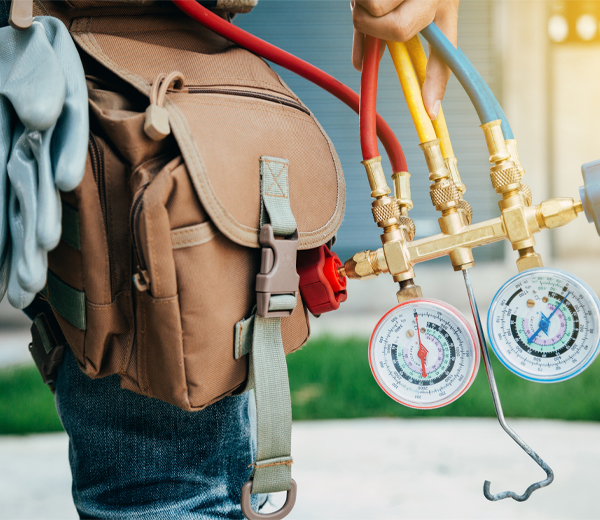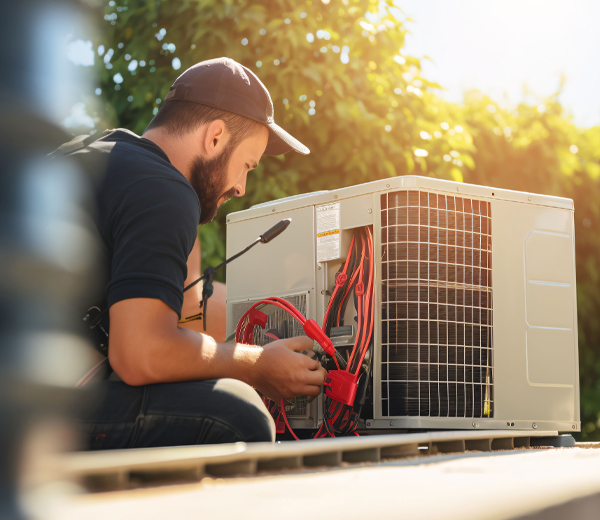PROGRAM
Air Conditioning and Refrigeration Technician

Diploma
Air Conditioning and Refrigeration Technician
Program Overview
CBT Technology Institute's 8-month HVAC-R training program blends practical instruction with innovative industry concepts to prepare you for entry-level positions. Experience hands-on training in simulated work environments, enhanced by student-focused instructors and supplemental resources provided by our industry partners.
Our student services department is here to support working adults and students from various backgrounds, ensuring a beneficial educational experience. Offered in English and Spanish, the program equips you with skills to install, service, and repair HVAC-R systems, expanding your job opportunities in the local market and beyond.
Program Details
-
- Total Semester Credits: 24
- Program Length: 8 months
- Next Start Date: October 27, 2025
- Location: Offered in all CBT campuses; Flagler, Hialeah, Cutler Bay
- Language of Instruction: English and Spanish
- Delivery Mode: Traditional On-Ground and via Hybrid distance education modality
- Certifications: Basic Refrigeration and Charging Procedures, Brazing and Soldering, Low GWP Refrigerant Safety, OSHA -10, NCCER CORE, and NCCER Level 1 Air Conditioning, EPA 608, EPA 609
Note: Completing a course or program in a language other than English may reduce employability where English is required.
COURSE DESCRIPTIONS
EET1033 – Fundamentals of Electricity (3 Semester Credits Hours)
This course offers a general introduction to the principles, concepts and laws applied to electric circuits. In-depth coverage of Ohm’s Law and its relation to voltage, current, resistance, followed by theoretical and practical applications of electrical components connected in series, parallel and series-parallel circuits. Also, the course focus on understanding of AC theory, components such as inductors, capacitors, transformers, electronics and semiconductors components, and its applications as well as the principles of operation of different devices and its appropriate selection.
CET1516 – Electric Motors Applications, Control and Troubleshooting (3 Semester Credits Hours)
This course is focused on the characteristics, operation, control, selection, installation and applications of different electric motors. Electric motors such as: single phase, three phases, hermetic compressors, multi-speed and variable and electronically commutated are studied. Activities in the labs are planned in order to connect, wiring starting methods, interpret connection diagrams and verify technical conditions of parts and troubleshooting. In addition, electrical and safety codes also will be emphasized.
ACR1052 – Fundamentals of Refrigeration and Air Conditioning (3 Semester Credit Hours)
This course is an introduction to basic concepts related to heat and air conditioning cooling, the study of the physical laws relating to refrigerants and basic components of a mechanical refrigeration system for vapor compression. It Includes topics such as: Types and functions of compressors, condensers, evaporators and expansion, types of refrigerants, the ozone layer, the rules of the Environmental Protection Agency, how to solder copper pipes, description of how a vacuum is done, how to charge a refrigeration system with refrigerant and the use of the recovery machine. The course will be focused on saving energy and preserving the environment by using green technologies with special attention to new technologies applied to high efficiency HVAC systems, as well as studying the mechanical and safety codes on the most significant topics related to the subject. This course is also taught in the Spanish Language.
ACR1113 – Refrigeration and Air Conditioning Electrical Systems (3 Semester Credit Hours)
A study of electrical circuits applied to air conditioning and heating. Topics include electrical symbols, schematics, real circuits, diagnostics of the most common electrical problems in a compressor’s electric motor, and forms or methods used to start a compressor. Other topics include electrical connections and air conditioning system protective controls, as well as explaining and making electrical connections of low voltage components. The course content will be taught through theory and practice. The course will be focused at saving energy and preserving the environment by using green technologies with special attention to new technologies applied to high efficiency HVAC systems, as well as studying the electrical and safety codes on the most significant topics related to the subject. This course is also taught in the Spanish Language.
ACR1215 – Commercial Refrigeration Systems. Service and Troubleshooting (3 Semester Credit Hours)
This course covers the installation and operation of different types of air conditioning systems. Topics include: mechanical components, standard and higher efficiency of the refrigeration cycle and indicators for the heat and cooling loads calculation, types of air conditioning systems: conditioner wall/window and mini-split system, split systems, package units and heat pumps. New technologies and advances in air conditioning systems designed high-efficiency are addressed. Skills develop in services, installation and repair of different air conditioning systems. In addition mechanical and safety codes will be emphasized.
ACR1500 – Air Conditioning Systems, Service and Troubleshooting (3 Semester Credit Hours)
This course discusses the installation and operation of different types of air conditioning systems used today. Topics include basic concepts of air conditioning systems, comfort conditions, AC load estimation, the use of diagrams, mechanical components of the system, and types of equipment including basics of heating systems. In workshops, students will acquire skills in handling tools and measurement instruments in the repair and installation of the units and components. The course will be focused at saving energy and preserving the environment by using green technologies with special attention to new technologies applied to high efficiency HVAC systems, as well as studying the mechanical and safety codes on the most significant topics related to the subject. This course is also taught in the Spanish Language.
ACR2420 – Air Distributions Systems and Duct Work (3 Semester Credit Hours)
This course is an introduction to the basic principles of air distribution and ventilation in AC systems. Topics include indoor air quality, methods for controlling pollution sources, ventilation and the use of means for cleaning the air, concepts of MERV and Naima, psychometrics, humidification, humidifiers, sizing, installation and servicing, troubleshooting and preventive maintenance, and ASHRAE 62.1 2007, and standards of acceptable indoor air quality. Other topics include duct system design, fundamentals of air flow, analysis of balance or equilibrium in supply and return ducts, DOAS systems, duct works, and insulation measurements. The course will be focused at saving energy and preserving the environment by using green technologies with special attention to new technologies applied to high efficiency HVAC systems, as well as studying the mechanical and safety codes on the most significant topics related to the subject. This course is also taught in the Spanish Language.
ACR1030C – Basic Construction for HVAC (3 Semester Credit Hours)
This 60-hour course provides HVAC technician students with a focused introduction to construction fundamentals critical for effective heating, ventilation, and air conditioning system work. Tailored for trade school learners, the curriculum emphasizes reading and interpreting blueprints, identifying construction materials, and understanding structural components that affect HVAC installation and performance. Through a mix of classroom instruction and hands-on labs, students will learn to assess building layouts, ensure system compatibility, and comply with safety and industry standards. This beginner-friendly course prepares students to collaborate with construction professionals and apply practical skills in real-world HVAC settings, laying a solid foundation for their technical career.




